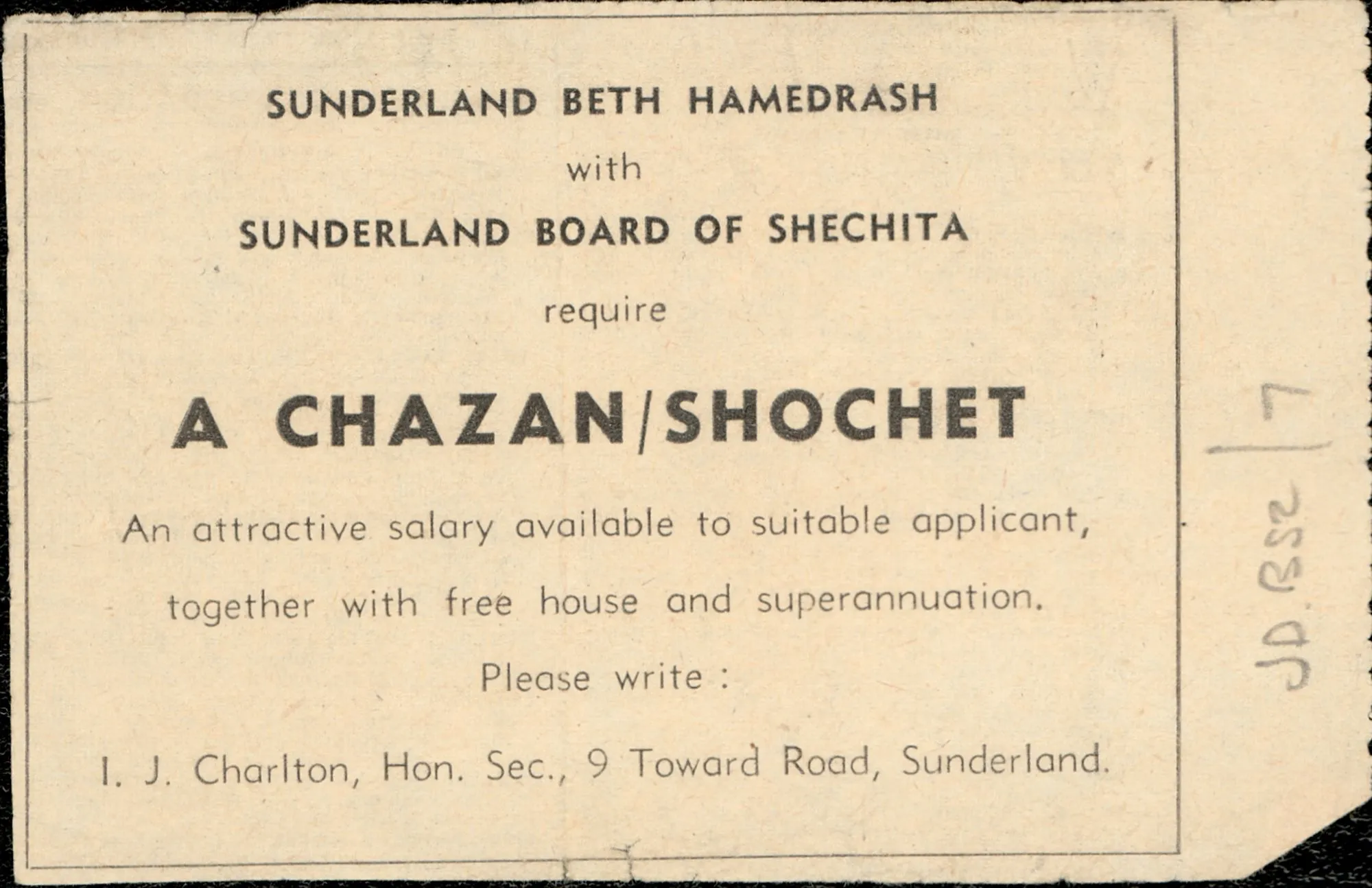
Gulfishan Rahman, a student from Durham University, researched food and kosher food preparation and production in the North East using material in the collections at Tyne and Wear Archives.
I have recently been on a placement with Tyne and Wear Archives working on the project titled ‘Unlocking North East Jewish Heritage’. My task was to research the food related materials and the kosher making techniques of the Jewish community settled in the North East England. The importance of kosher practices and the gradual establishment of Board of Shechitas made me realise the crucial role played by a shochet and a butcher. Therefore, the focus of the research shifted to the understanding of people involved in shochetim through the various meeting records, annual reports, laws, rules and regulations of Newcastle and Sunderland Board of Shechita held by Tyne and Wear Archives.
A shochet is a highly skilled officer who is equipped by every Jewish community to perform Kashruth or the consumption of meat and poultry in accordance with the Dietary Laws.
The Newcastle and Sunderland community had its shochetim at every stage of its development. Each congregation employed its own shochet and independent butcher, and he in turn contributed to the salary of the shochet from a levy on the sales of his meat and poultry. As the community grew and the numbers of shochetim increased, it became necessary to set up a board to coordinate these activities. Hence, Board of Shechita came into existence. Newcastle Board of Shechita was established in 1922 followed by Sunderland Board of Shechita in 1934.
Newcastle upon Tyne
The laws of the board highlighted that all shochetim must possess the London Rabbinical Commission Shechita License which was to be renewed annually. It also mentioned about the charges to be levied on the butchers and poulterers holding the license of the board. These charges were deemed necessary for the working of the board. Shechita was to be taught to desirous students with the written approval by the board. Facilities were provided for the tuition of Shechita students from the local Yeshivas or the educational institutions.


JD.BS1.5.3: The laws of the board on Shechita Students
JD.BS1.4.5: The Annual report of 1954 on the Student Shochetim
Sunderland
According to the laws of Sunderland Board of Shechita, two shochetim or other number considered by the board were to be employed for the purpose of carrying out the shechita. During a vacancy, the board would consider any nomination from the congregation to which the previous shochet was attached before making a new appointment. The salary would be negotiated between the board and the shochet. One shochet would carry out the shechita and the other would be performing the duties of supervisor and shechita of poultry. This role would be rotated weekly unless directed otherwise.
The rules and regulations for the retail butchers licensed to sell meat for the use of Jews were similarly followed by both the boards. The key points were:
- The official seals of the board had to be affixed by the shochet or other authorised person before being taken away from the market.
- A fixed weekly sum had to be paid to the board by the butcher whenever the services of a shomer were required.
- The meat could not be kept by the butcher for more than three days after shechita unless watered within three days.
- Only a Jewish person could deliver the meat and poultry to the customers. Otherwise, it must be sent out duly signed.
- The butcher shops were to be closed on Shabbos and Yom Tov.
Licenses: The licenses in English and Yiddish had to be exhibited by the butchers in the shop. All licenses were reviewed by the board annually to be renewed for the coming year. If the licenses were revoked, the butchers were not allowed to continue to sell kosher meat. The withdrawal of the license was to be publicly announced by the board.
A case study of Berdugo butchers shop in Sunderland

JD.BS2.1.1.104- Minutes of the meeting describing Berdigo’s complaint
Mr. Berdugo was found guilty of selling a liver brought from an outside source and selling it as Glatt Kosher which in fact was not Glatt. He was reprimanded by the president of the board. He was told that his license could be revoked and thereby his right to remain in the UK. A condition of his license was that the Mashgiach would have the set of keys to the shop and freezers. He could only sell meat supplied from the authorised sources. However, Mr. Berdugo withdrew his license.

JD.BS2.8: Notice for the customers of Berdugo’s Butcher Shop
A public announcement was made on 2nd November 1978 for all the customers of Berdugo’s butcher shop. It was posted in both synagogues. The notice advised the people who had bought meat or liver from him during the course of past months to dispose of unless the seal is visible. If somebody had fried or cooked liver after koshering and the used pots or frying pans were known, these were required kashering. Each individual had to obtain Rabbinical advice in this matter. An address where the Rabbi would be present to assist was given for the public who were not familiar with the process of kashering.
